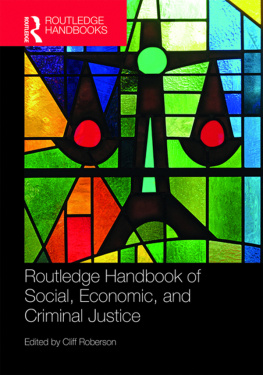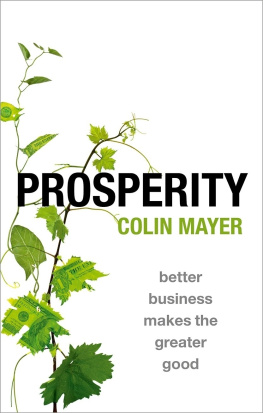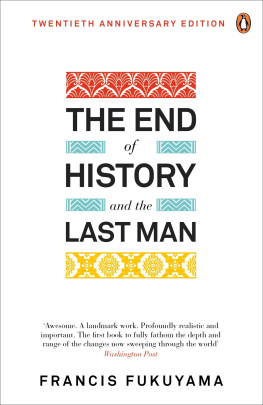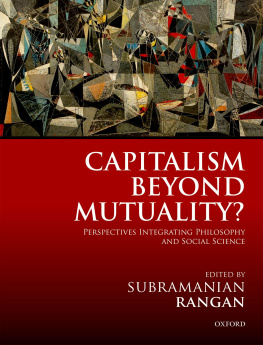FRANCIS FUKUYAMA
TRUST
The Social Virtues and the Creation
of Prosperity
A FREE PRESS PAPERBACKS BOOK
Published by Simon & Scbuster

FREE PRESS PAPERBACKS
A Division of Simon & Schuster Inc.
1230 Avenue of the Americas
New York, N.Y. 10020
Copyright 1995 by Francis Fukuyama
All rights reserved, including the right of reproduction in whole or in part in any form.
First Free Press Paperback Edition 1996
FREE PRESS PAPERBACK and colophon are trademarks of Simon & Schuster Inc.
Designed by Carla Bolte
Manufactured in the United States of America
20 19 18 17 16 15 14 13 12 11
Library of Congress Cataloging-in-Publication Data
Fukuyama, Francis.
Trust : The social virtues and the creation of prosperity / Francis Fukuyama.
p. cm.
Includes bibliographical references and index.
ISBN-13: 978-0-684-82525-0
eISBN-13: 978-1-4391-0747-8
1. EconomicsMoral and ethical aspects. 2. Trust (Psychology). 3. Virtue. 4. Economic history1945. I. Title.
HB72.F85 1992
306.3dc20 95-19320
CIP
For Laura, one and only
Emile Durkheim The Division of Labor in Society A society composed of an infinite number of unorganized individuals, that a hypertrophied State is forced to oppress and contain, constitutes a veritable sociological monstrosity. Moreover, the State is too remote from individuals; its relations with them too external and intermittent to penetrate deeply into individual consciences and socialize them within. A nation can be maintained only if, between the State and the individual, there is interposed a whole series of secondary groups near enough to the individuals to attract them strongly in their sphere of action and drag them, in this way, into the general torrent of social life. Occupational groups are suited to fill this role, and that is their destiny.
Alexis de Tocqueville, Democracy in America The art of association then becomes, as I have said before, the mother of action, studied and applied by all.
www.SimonandSchuster.com
CONTENTS
PART I
The Idea of Trust: The Improbable Power of Culture in the Making of Economic Society

PART II
Low-Trust Societies and the Paradox of Family Values

PART III
High-Trust Societies and the Challenge of Sustaining Sociability

PART IV
American Society and the Crisis of Trust

PART V
Enriching Trust: Combining Traditional Culture and Modern Institutions in the Twenty-first Century

PREFACE
When Alexander Kojve, the twentieth centurys preeminent interpreter of Hegel, concluded at mid-century that the latter was essentially correct in declaring that history had ended, he decided as well that philosophers like himself had no further useful work to do. Relegating the study of philosophy to weekends, he became a fulltime bureaucrat in the Commission of the newly formed European Economic Community, where he remained until his death in 1968. In the light of this progression, it seemed only natural that I also should follow my own The End of History and the Last Man with a book about economics.
It seems to me that the emphasis on economics is almost inevitable. There has, of course, been a great deal of Sturm und Drang following the collapse of communism, with apparent instability and much pessimism in Europe concerning that continents political prospects. But virtually all political questions today revolve around economic ones; security problems themselves are shaped by issues welling up from within fragile civil societies, East and West. But economics is not what it appears to be either; it is grounded in social life and cannot be understood separately from the larger question of how modern societies organize themselves. It is the arena in which modern recognition struggles play themselves out. This book, then, is not a cookbook in the competitiveness genre, explaining how to create a winning economy or how Americans ought to imitate the Japanese or Germans. It is, rather, the story of how economic life reflects, shapes, and underpins modern life itself.
A study that tries to compare and contrast different cultures with respect to economic performance is an open invitation to insult virtually everyone it touches upon. I have covered a great deal of ground in this book, and I am sure that people more knowledgeable than I about the particular societies under discussion will be able to think of countless objections, exceptions, and contradictory pieces of evidence to the different generalizations contained here. To those who feel I have misunderstood their culture or, worse yet, said something slighting or belittling about it, I apologize in advance.
I owe a debt of gratitude to many people. Three editors influenced the book greatly: Erwin Glikes, who signed the book prior to his untimely death in 1994; Adam Bellow of the Free Press, who saw it to completion; and Peter Dougherty, who labored long hours to put the manuscript into final shape. I also thank, for their help at various points along the way, Michael Novak, Peter Berger, Seymour Martin Lipset, Amitai Etzioni, Ezra Vogel, Atsushi Seike, Chie Nakane, Takeshi Ishida, Noritake Kobayashi, Saburo Shiroyama, Steven Rhoads, Reiko Kinoshita, Mancur Olson, Michael Kennedy, Henry S. Rowen, Clare Wolfowitz, Robert D. Putnam, George Holmgren, Lawrence Harrison, David Hale, Wellington K. K. Chan, Kongdan Oh, Richard Rosecrance, Bruce Porter, Mark Cordover, Jonathan Pollack, Michael Swaine, Aaron Friedberg, Tamara Hareven, and Michael Mochizuki. Abram Shulsky, as usual, contributed greatly to the books conceptualization.
Once again, I am grateful to James Thomson and the RAND Corporation, which tolerated my presence as I was writing this book. I owe a long-standing debt of gratitude to my literary agents, Esther Newberg and Heather Schroder, who made both this and the volume that preceded it possible. Much of the material covered in this book would never have come to my attention but for the hard work of my research assistants, Denise Quigley, Tenzing Donyo, and especially Chris Swenson, who was of invaluable assistance through all phases of this study.
My wife, Laura, to whom the book is dedicated, has always been a careful reader and critic, and helped enormously. She was a source of great support throughout this effort.
Yoshia Fukuyama, my father, was a sociologist of religion, and passed down to me several years ago his library of social science classics. After resisting this perspective for many years, I think I now more fully understand his own interest in it. He read and commented on the manuscript, but passed away before the book could be published. I hope he understood how much his own lifes interests are reflected here.
Next page






